Email marketing has been a staple in the digital marketing world for quite some time now, and for good reason. It offers a direct line of communication with your target audience, allowing you to reach them right in their inboxes. But let’s be real, we’ve all received those impersonal, spammy emails that make us want to hit the unsubscribe button faster than you can say “discount code.”
That’s where the magic of AI comes into play. Imagine being able to craft personalized, engaging emails that actually resonate with your audience, increasing the chances of them taking action and boosting your sales. It’s like having a team of expert copywriters working around the clock to create content that speaks directly to your customers’ needs and interests.
Traditional email campaigns often fall short due to their one-size-fits-all approach, resulting in low open rates, click-throughs, and conversions. But with AI-powered email marketing, you can bid farewell to those generic, cookie-cutter messages and embrace a whole new level of personalization.
In this article, we’ll dive into the world of AI-driven email marketing tools, exploring how they can help you craft compelling content, optimize subject lines, and deliver the right message to the right person at the right time.
Let’s get started.
The Benefits of AI in Email Marketing
AI brings a treasure trove of advantages to email marketing. Here are some of the key benefits:
- Increased Personalization: Imagine emails that greet customers by name, recommend products based on their purchase history, and tailor offers to their specific interests. AI makes this a reality, crafting dynamic content that resonates deeply with each recipient.
- Improved Segmentation: AI algorithms analyze vast amounts of customer data to segment your audience with laser precision. This allows you to target specific groups with highly relevant campaigns, maximizing engagement and conversion rates.
- Optimized Send Times: No more guessing games about when to hit “send.” AI predicts the ideal time for individual subscribers to open emails based on their past behavior. This ensures your message lands in their inbox at the perfect moment, boosting open rates and click-through rates.
- Enhanced Content Creation: AI can be your secret weapon for crafting compelling email content. It generates personalized subject lines that grab attention, suggests improvements to existing copy for better engagement, and helps maintain a consistent brand voice across all your campaigns.
- A/B Testing Efficiency: A/B testing different email elements is crucial for optimization. AI streamlines this process by automating tests of various subject lines, calls to action (CTAs), and visuals. You’ll receive data-driven insights faster, allowing for continuous improvement and maximum campaign performance.
These are just a few of the ways AI is transforming email marketing. In the following sections, we’ll delve deeper into how you can leverage these benefits to turn your email marketing into a sales powerhouse.
How to Implement AI Email Marketing for Conversions and Sales
AI isn’t just a buzzword; it’s a toolbox filled with practical applications to supercharge your email marketing. Let’s explore some key ways to put AI to work:
1. Personalization on Autopilot
Imagine the impact of emails that feel like they were written just for you. AI makes this a reality with features like:
- Dynamic Content: AI pulls data on purchase history, browsing behavior, and other relevant information to personalize content within your emails. For example, an email to a customer who recently viewed a specific product could showcase similar items or highlight a special offer.
- AI-powered Product Recommendations: Ever notice how Amazon seems to magically suggest products you’re interested in? AI can do the same for your email marketing. It analyzes customer data to recommend products relevant to each recipient’s interests, increasing the likelihood of a purchase.
- Tailored Greetings and Offers: A simple “Dear Valued Customer” just doesn’t cut it anymore. AI personalizes greetings with the customer’s name and tailors offers based on their past interactions with your brand. This creates a more welcoming and relevant experience.
2. Smarter Segmentation with AI
Gone are the days of blasting generic emails to your entire list. AI helps you segment your audience strategically:
- Laser-Focused Segmentation: AI analyzes demographics, interests, engagement levels, and other data points to create highly targeted segments. This allows you to craft campaigns that resonate with specific customer groups, leading to higher conversion rates.
- Identifying High-Value Segments: AI can pinpoint your most valuable customer segments, allowing you to tailor campaigns to maximize their engagement and loyalty.
- Dynamic Segments that Update Automatically: AI keeps your segments fresh by automatically updating them based on customer behavior. This ensures your campaigns are always targeting the right audience at the right time.
3. Optimizing Send Times for Maximum Impact
When it comes to email marketing, timing is everything. AI helps you send emails at the precise moment for maximum impact:
- Predicting Ideal Open Times: AI analyzes historical data to predict the optimal time for each individual subscriber to open your emails. This ensures your message arrives when they’re most likely to engage with it.
- Boosting Open and Click-Through Rates: Sending emails at the right time significantly increases the chances of subscribers opening them and clicking on your CTAs.
- Accounting for Time Zones and Behavior Patterns: AI factors in time zones and individual user behavior patterns to ensure your emails land in inboxes during peak engagement times.
4. Crafting Compelling Content with AI Assistance
AI isn’t here to replace your creativity; it’s here to empower it. Here’s how AI can elevate your email content:
- Personalized Subject Lines that Grab Attention: Forget generic subject lines. AI generates personalized subject lines that are unique to each recipient and pique their curiosity, encouraging them to open your email.
- AI-powered Copywriting Improvements: Writer’s block? AI can analyze your existing email copy and suggest improvements for better clarity, engagement, and brand voice consistency.
- Maintaining Brand Voice and Consistency: AI helps you maintain a consistent brand voice across all your email campaigns. This builds trust and recognition with your audience.
5. Streamlining A/B Testing with AI
A/B testing different elements of your email campaigns is crucial for optimization. AI streamlines this process, allowing you to identify winning variations faster:
- Automated A/B Testing: AI automates the A/B testing of various email elements like subject lines, CTAs, visuals, and content. This saves you time and resources.
- Data-Driven Insights for Faster Optimization: By analyzing A/B test results, AI provides data-driven insights on which variations performed best. This allows you to quickly identify winning elements and continuously optimize your campaigns for maximum performance.
Top AI Email Marketing Tools to Consider
Now that you’ve seen the power of AI in email marketing, you might be wondering which tools to use. Here are a few popular options to consider, but keep in mind there are many on the market:
Choosing the right tool depends on your specific needs and budget. Here are some key factors to consider:
- Features offered (personalization, segmentation, A/B testing)
- Ease of use and user interface
- Integration with existing marketing platforms
- Pricing plans and scalability for future growth
We’ll provide a brief overview of three popular AI email marketing tools, but be sure to research and compare features before making a decision.
1. Mailchimp
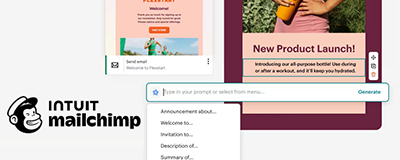
Mailchimp is an all-in-one marketing platform that offers AI-powered features to streamline email marketing campaigns. With AI tools, Mailchimp helps automate personalized campaigns at scale, generate on-brand designs, send emails at the optimal time, and test content variations for better engagement.
Key Features
- AI-generated automations and fully-built emails
- Personalized suggestions to improve email content
- AI-powered design generation using brand assets
- Send time optimization based on predicted engagement
- A/B testing of content variations
Pricing: Mailchimp offers different pricing plans, ranging from free to premium, depending on the number of subscribers and features you need.
2. GetResponse
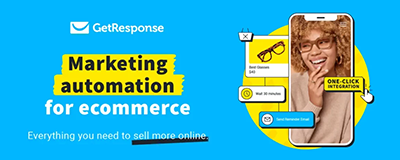
GetResponse is an email marketing platform that offers an AI-powered email generator using OpenAI technology. This feature boosts email marketing efforts by providing industry and goal-optimized subject lines and content, helping to increase open and click-through rates.
Key Features
- OpenAI-powered email generator for subject lines and content
- Industry trend analysis for content optimization
- A/B testing for subject lines and content
- AI email assistant for brainstorming and ideation
Pricing: GetResponse provides tiered pricing plans based on the number of contacts and features, including a free plan with limited access.
3. Brevo
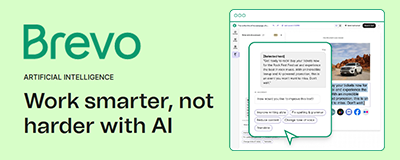
Brevo is an email marketing platform that offers AI-powered features to enhance email content creation, tone of voice, and send time optimization. With AI assistance, users can craft better messages faster, adjust the tone, and automatically send emails at the best time for each recipient.
Key Features
- AI-suggested subject lines and email content
- Tone adjustment (formal or casual) using AI
- Send time optimization for each recipient based on engagement data
Pricing: Brevo offers a free plan for basic features, with paid plans available for additional capabilities.
4. Phrasee
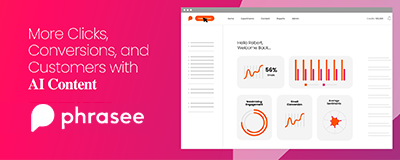
Phrasee is an AI-powered platform that delivers on-brand content with enterprise-grade controls and optimization at scale. It generates, predicts, and analyzes the best-performing content for various marketing and sales emails, ensuring consistent brand experiences across the digital customer journey.
Key Features
- AI-generated, on-brand content with tone and voice controls
- Predictive modeling for best-performing content
- Real-time language insights and performance reporting
- Automated testing and optimization of message variants
Pricing: Custom pricing based on business needs.
5. Motiva
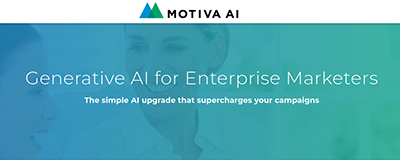
Motiva is an AI platform designed for enterprise marketers, offering generative AI capabilities to supercharge campaigns. It aims to increase opens, clicks, and purchases while decreasing spam, unsubscribes, and non-responders through AI-powered optimizations and audience discovery.
Key Features
- Automated measurement, analytics, and A/B testing
- Audience discovery and segmentation
- Per-contact send time optimization
- Intuitive campaign performance reporting
Pricing: Custom pricing based on business needs.
6. OutboundFlow.ai
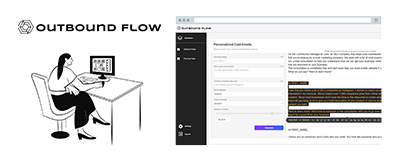
OutboundFlow.ai enables you to create personalized AI-powered cold emails in one click, helping you close more deals with AI-powered outreach at scale. The platform is powered by OpenAI’s GPT-3 and Eleuther AI’s GPT Neo model to optimize your content for personalization and engagement.
Key Features
- Personalized cold emails optimized for engagement
- Human-like content generation powered by GPT-3 and GPT Neo
- Multi-language support (20+ languages)
- One-click personalized cold email generation
Pricing: Basic plan starts at $49 per month.
AI Email Marketing Trends and Future Outlook
The world of AI email marketing is constantly evolving, and new innovations are emerging all the time. Here’s a glimpse into what the future holds:
- Predictive Content: AI will become even more adept at predicting what content will resonate with each subscriber. This could include recommending products they haven’t even considered yet but might be interested in based on their past behavior and broader trends.
- Interactive Content: AI-powered interactive elements within emails will become more commonplace. Imagine emails with polls, quizzes, or even augmented reality experiences that boost engagement and conversions.
- Conversational email marketing: AI-powered chatbots and virtual assistants may be integrated into email campaigns, enabling two-way conversations and real-time interactions with subscribers.
- Multi-channel integration: AI will play a crucial role in seamlessly integrating email marketing with other channels, such as social media, push notifications, and targeted advertising, for a cohesive omnichannel experience.
While AI presents exciting opportunities, there are also potential challenges and limitations to consider. These may include data privacy concerns, the risk of over-automation and loss of human touch, and the need for continuous training and monitoring of AI systems to maintain accuracy and relevance.
Nonetheless, the future of email marketing is inextricably linked with the advancement of AI technology. By embracing these innovative tools and strategies, businesses can stay ahead of the curve, deliver exceptional customer experiences, and drive tangible results in terms of conversion and sales.
Frequently Asked Questions
Here are some of the most common questions about AI email marketing:
Q1. Is AI going to replace email marketing copywriters?
While AI tools can assist in generating compelling email content, they are not meant to replace human copywriters entirely. AI should be viewed as a collaborator and a tool to enhance and streamline the content creation process. Human expertise, creativity, and oversight are still essential for crafting truly engaging and authentic messaging that resonates with audiences.
Q2. How can I ensure that AI-generated content is relevant and engaging for my audience?
To ensure AI-generated content remains relevant and engaging, it’s crucial to:
- Provide high-quality data and context for the AI system to work with, such as customer profiles, brand guidelines, and industry-specific knowledge.
- Continuously monitor and refine the AI’s output, providing feedback and adjustments to improve accuracy and relevance over time.
- Maintain human oversight and review processes to ensure the content aligns with your brand voice, messaging, and overall marketing strategy.
Q3. How much does AI email marketing cost?
The cost of implementing AI email marketing tools can vary depending on the specific platform, features, and pricing model. Some AI email marketing tools offer subscription-based plans starting from a few hundred dollars per month, while others may charge based on the number of contacts or emails sent. Additionally, there may be one-time implementation fees or costs for integrating with existing marketing systems.
However, it’s important to consider the potential return on investment (ROI) that AI email marketing can deliver through increased engagement, conversions, and revenue. Many businesses find that the investment in AI tools is offset by the time and resource savings, as well as the improved performance of their email campaigns.
Q4. Can I use AI email marketing tools with a small email list?
Absolutely! AI email marketing tools can benefit businesses of all sizes, including those with smaller email lists. In fact, for smaller businesses or startups, leveraging AI can provide a significant competitive advantage by enabling personalized and effective email campaigns without the need for extensive resources.
AI tools can help optimize the performance of even smaller email lists by delivering highly targeted and relevant content, identifying the best send times, and continuously refining campaigns based on real-time data and insights.
Q5. How can I measure the success of my AI email marketing campaigns?
To measure the success of your AI-powered email marketing campaigns, you can track several key metrics:
- Open rates: Monitoring open rates can provide insights into the effectiveness of your subject lines and send time optimization efforts.
- Click-through rates (CTRs): CTRs indicate how compelling and relevant your email content is to your audience, and can be a good indicator of engagement and potential conversions.
- Conversion rates: Ultimately, you’ll want to track conversions, whether that’s purchases, form submissions, or any other desired action tied to your campaign goals.
- Unsubscribe rates: Keep an eye on unsubscribe rates to ensure your AI-generated content and personalization efforts are resonating with your audience and not causing fatigue or disengagement.
- Revenue and ROI: By attributing revenue directly to your email campaigns, you can calculate the return on investment (ROI) of your AI email marketing efforts and justify the associated costs.
- Engagement metrics: Depending on your goals, you may want to track metrics like time spent reading emails, social shares, or interactions with embedded elements like surveys or quizzes.
Q6. Can AI email marketing tools integrate with other marketing softwares?
Yes, most reputable AI email marketing tools are designed to integrate with a wide range of marketing software and platforms. This integration capability is crucial for ensuring a seamless flow of data and consistent customer experiences across various touchpoints.
Some common integrations for AI email marketing tools include:
- Email Service Providers (ESPs): AI tools often integrate with popular ESPs like Mailchimp, Constant Contact, Campaign Monitor, and others, allowing for easy email deployment and tracking.
- Customer Relationship Management (CRM) systems: Integrations with CRMs like Salesforce, HubSpot, or Zoho CRM enable the synchronization of customer data, enhancing personalization and segmentation capabilities.
- Marketing Automation Platforms: AI email marketing tools can connect with marketing automation platforms like Marketo, Pardot, or ActiveCampaign, facilitating cross-channel campaign orchestration and nurture flows.
- E-commerce Platforms: Integrations with platforms like Shopify, WooCommerce, or Magento allow AI tools to access customer purchase data, enabling highly personalized product recommendations and abandoned cart campaigns.
- Analytics and Reporting Tools: AI email marketing platforms often provide integrations with tools like Google Analytics, allowing for comprehensive tracking and attribution of email marketing performance.
When evaluating AI email marketing tools, it’s essential to ensure that they offer the necessary integrations to fit seamlessly into your existing marketing technology stack. This not only streamlines workflows but also ensures consistent data flows, enabling more accurate personalization and better overall campaign performance.
Q7. How can I ensure that my AI email marketing efforts are ethical and transparent?
As AI technology becomes more prevalent in email marketing, it’s crucial to prioritize ethical practices and transparency to maintain consumer trust and comply with relevant regulations. Here are some best practices to ensure your AI email marketing efforts are ethical and transparent:
- Data Privacy and Consent: Ensure that you have obtained proper consent from subscribers to collect and use their data for personalization and marketing purposes. Adhere to data privacy regulations like GDPR and CCPA, and provide clear opt-out mechanisms.
- Avoid Deception: While AI can help create compelling content, ensure that the messaging remains truthful, accurate, and does not intentionally mislead or deceive recipients.
- Responsible AI Development: Work with AI email marketing vendors that prioritize ethical AI development practices, such as mitigating biases in training data and algorithms, and ensuring transparency and accountability in the AI systems.
- Human Oversight: Maintain human oversight and review processes to ensure that AI-generated content aligns with your brand values, messaging, and overall marketing strategy.
By prioritizing ethical and transparent practices in your AI email marketing efforts, you can not only comply with regulations but also build and maintain trust with your audience, fostering long-term success and positive brand perception.
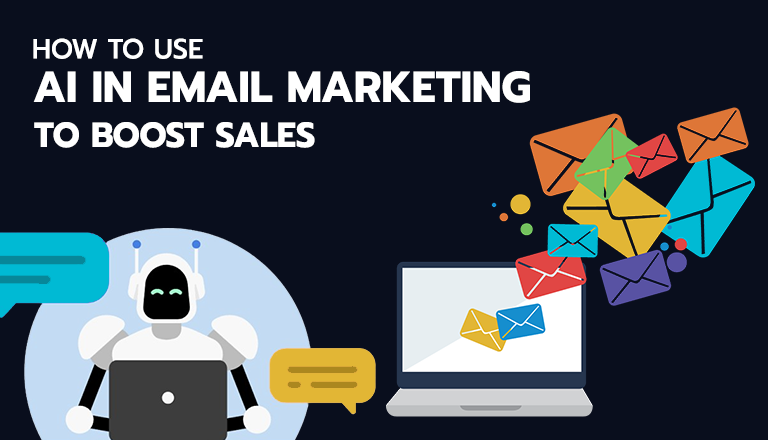
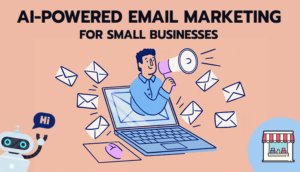
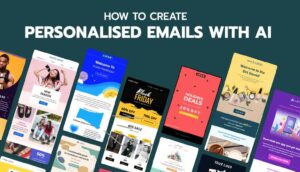


Share Your Thoughts: